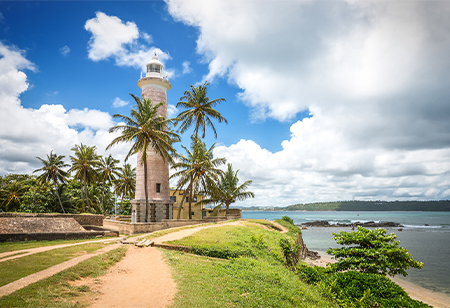
Case Study: Sri Lanka's Tourism Efflux with AI


At present, people's every touch point, from planning travel and activity reservations to tourism destinations, integrates artificial intelligence. AI in tourism helps current-age travelers make clear decisions. For the travel industry, this reliance on artificial intelligence in travel presents a tremendous opportunity to connect with the younger generations through digital channels, engaging them in innovative ways and building lasting relationships. For these technologically savvy tourists, technology is an integral part of their travel experience, from the preliminary stages of planning to the actual trip, rather than just an extra convenience. Sri Lanka's tourism Efflux is attracting travelers to explore the travel destinations of the country.
CEO Insights Asia recently interacted with Nishantha Jayasinghe, CEO, Luxury Holidays Asia. He says, “The travel and tourism industry is changing with AI and virtual reality coming into it. AI and virtual reality can help us monitor consumer behaviors. I got a mobile phone when I was 17 years old, but my kid, who is seven months old, is addicted to watching YouTube. He doesn't know how to type, but at least he knows how to scroll and go to the next video. That is the technological advance, and that is the consumer behavior at present.”
Current Generation and AI Influence and Travel and Tourism
Jayasinghe says, “Today’s generation is driven by technology. They use social media to research and explore new things. We must present ourselves attractively and ethically on those platforms to pull people to the destinations. The marketing communication strategies should be aligned with such futuristic trends and the future customer base. We must analyze data using AI and other tools to understand consumer behavior meticulously—whether using the right or left brain for decision-making. “
He adds, “Whatever the business we are in, consumer behavior is changing according to purely their experience and associations. We have to be extremely careful with our analysis and decision-making. We need to monitor the trends, and we need to address them accordingly,” Jayasinghe adds. He continues, “Simultaneously, another opportunity is also coming. In the future, many people will start to travel, looking for peace of mind and keeping their phones away. So, there will be a huge demand for the meditation sector, health sector, and help in wellness tourism. Sustainable tourism practices will definitely boom. Similarly, people are getting good and bad from social media and easy access to the internet. As people are rational, which means the same way they do their jobs and other things, rationally, they will look for their health and mental status.”
AI for Sustainable Travel and Tourism in Sri Lanka
Artificial intelligence-driven vulnerability is helping assist resorts and airlines in improving their capacities and stock levels to meet the actual needs of the consumers, thereby reducing overbooking and waste. On the other hand, the same thing happens with artificial intelligence-powered route planning, reducing energy use and environmental impacts. It helps reduce energy usage in tourist establishments by adjusting lighting, heating, and cooling systems according to occupancy and environmental conditions. All the steps significantly reduce energy use and greenhouse gas emissions.
AI helps tourists make sustainable choices during their travels. The eco-friendly and sustainable transportation options and the initiatives can be provided with real-time information by AI-powered chatbots and virtual assistants. AI helps in personalizing trip recommendations based on individual preferences and environmental considerations to encourage tourists to prioritize sustainable activities and attractions.
People foreseeing eco-adventures will prioritize Sri Lanka's breathtaking natural splendor, spanning lush rainforests to pristine shorelines. The motto and the principles of sustainable practices are what set Sri Lanka apart. It has taken precautionary steps to safeguard its delicate natural environments, safeguard cultural treasures, and lift the local populace, ensuring a harmonious coexistence between tourism and nature.
The Sri Lanka Tourism Development Authority has taken sustainability as a key factor in protecting and preserving the island's outstanding natural and cultural heritage to make the destination remain a popular tourist destination for locals and foreigners both now and in the future.
What more Does the Travel Industry Need in the Near Future?
Smart Travel in Smart Cities:
Soon, travelers wouldn’t be exploring cities; they would be exploring ‘smart cities’ rather more smartly. Cities would transition into smart cities with sensors to collect and manage data-related information like traffic and tourist flows, pollution levels, etc., within a city. Input would be provided by them highlighting how to create better synergies between these factors to run a city more efficiently. Although this would be mainly done through the Internet of Things (IoT), AI will be used to analyze the huge amounts of data collected.
Self-Driving Cars
The future will witness more cities adapting to the use of self-driving cars, buses, and taxis. This would leave no room for human callousness or error while driving on roads and thereby reduce road accidents. It would further lead to fewer traffic jams that are caused by oblivious human drivers and their improper driving habits. AI technologies power self-driving cars. Hence, AI would change the way locals and travelers explore the cities.
Therefore, the expectations for the advantages of AI in the travel and tourism industry are multifold. AI is assisting businesses to streamline processes, deliver excellence to their customers, and drive revenues. On the other hand, AI personalizes the customer journey and serves their needs for the better. With more advancement in the future, the hospitality industry will be able to provide its customers with exactly what they want.

